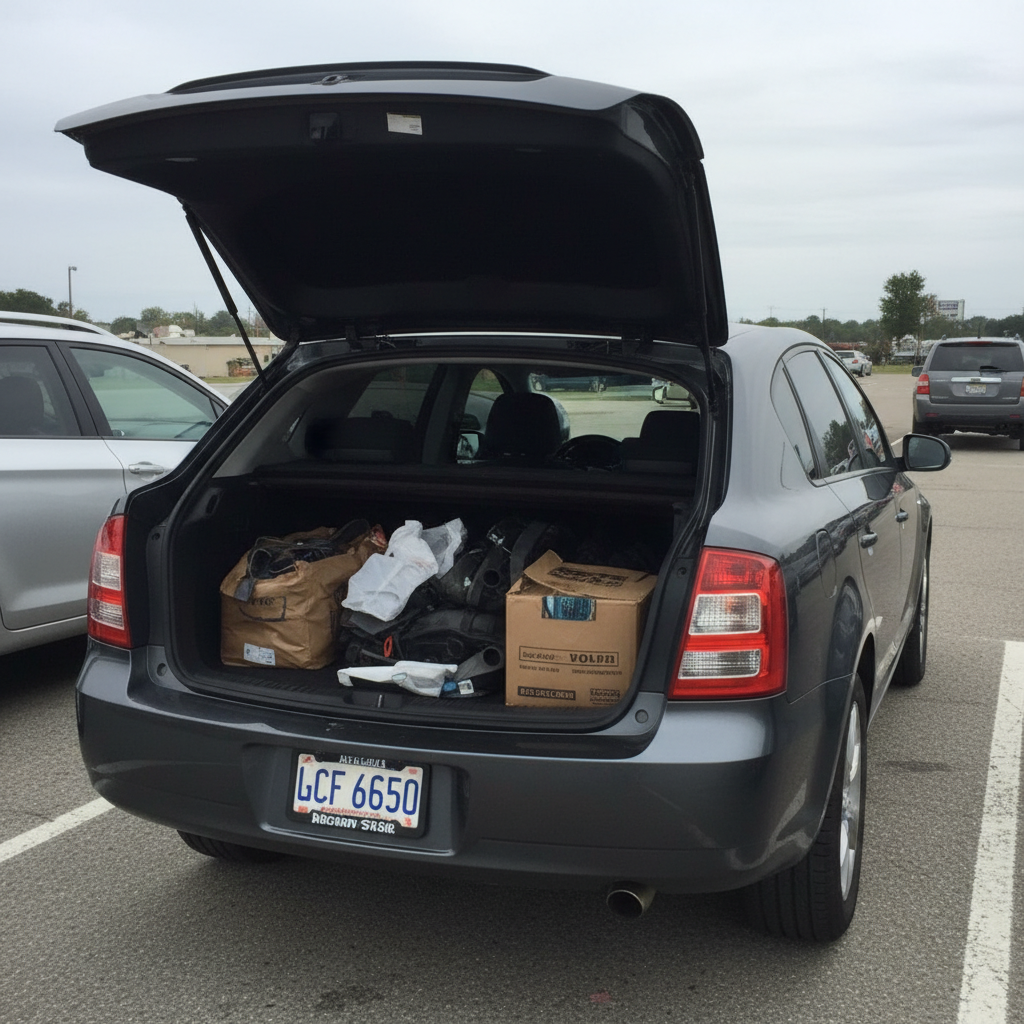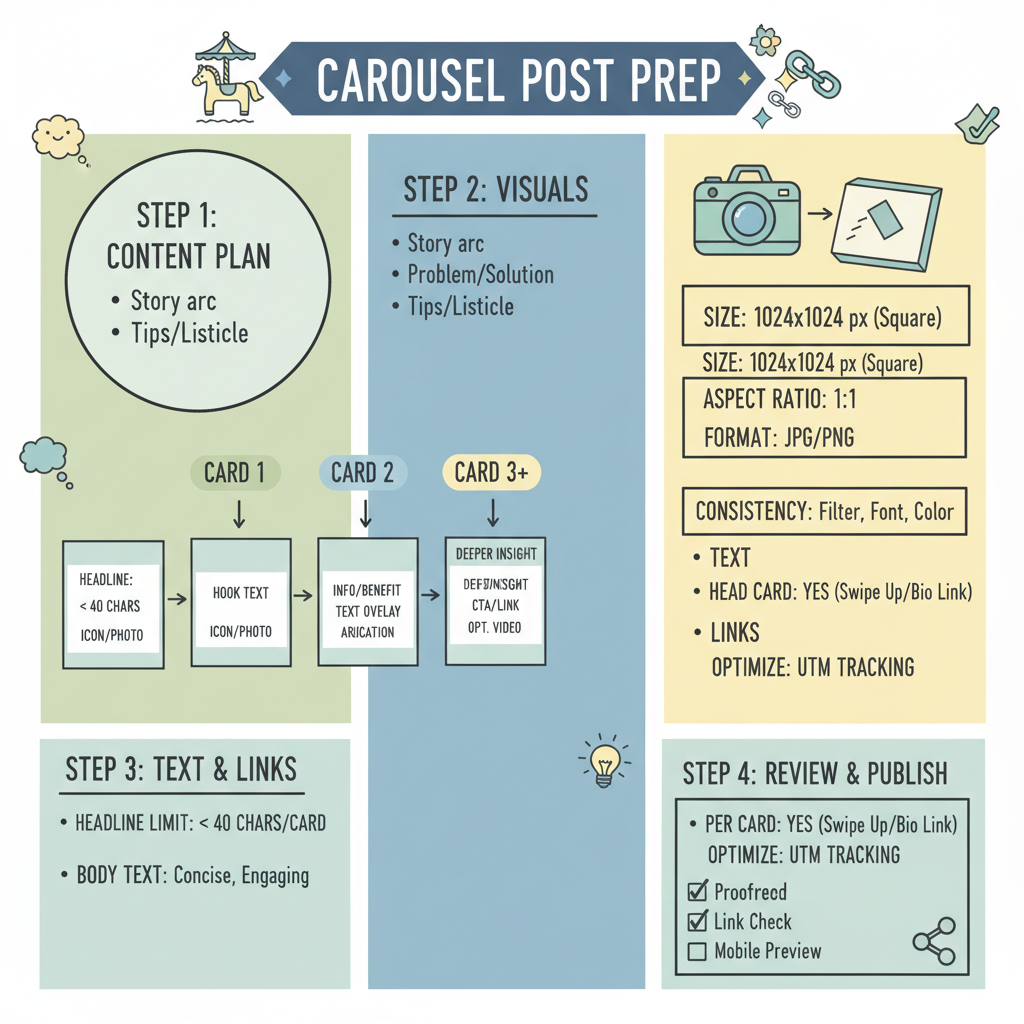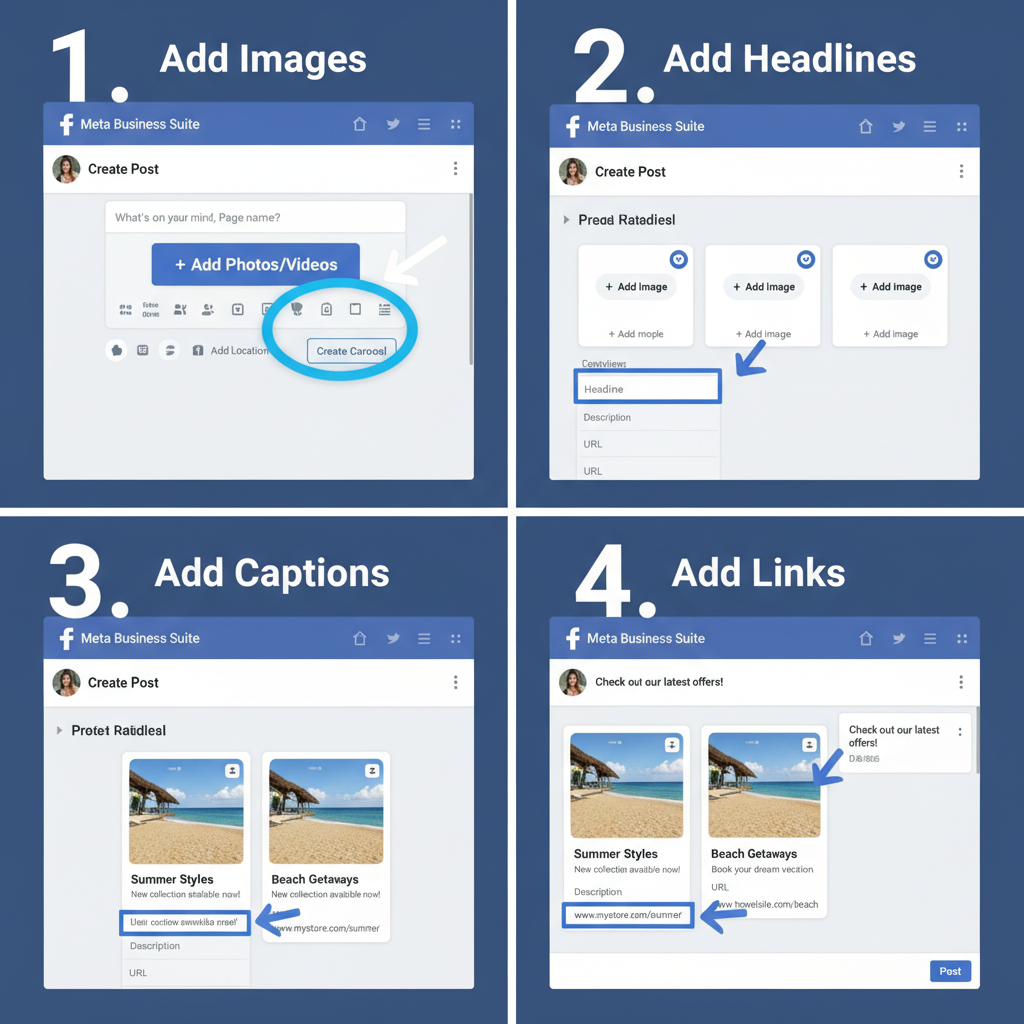How to Make a Carousel Post on Facebook Step-by-Step
Learn how to create engaging Facebook carousel posts step-by-step, from content prep to publishing, to boost clicks, conversions, and storytelling.

How to Make a Carousel Post on Facebook Step-by-Step
If you want to boost engagement and click-through rates on your Facebook content, learning how to make a carousel post on Facebook is a smart move. A carousel post lets you display multiple images or videos in a swipeable format, each with its own link, caption, and headline. This visually rich format works well for storytelling, showcasing products, and driving specific actions—both for organic posts and paid ads.
---
What Is a Facebook Carousel Post and Why It’s Effective
A Facebook carousel post showcases up to ten images or videos in a single interactive post. Each "card" can feature its own headline, caption, and clickable link.
Benefits of carousel posts include:
- Storytelling: Share a sequential narrative or campaign journey.
- Product variety: Highlight distinct products, features, or services.
- Higher engagement: Interactive swiping keeps viewers involved.
- Improved conversion potential: Custom links can direct users to targeted destinations.

Because viewers can explore multiple content pieces without leaving their feed, carousel posts often outperform single-image formats in engagement and conversions.
---
Requirements for Carousel Posts
Before you start creating your carousel, review these prerequisites and recommendations.
| Type | Requirements | Notes |
|---|---|---|
| Organic Carousel | Published from a Facebook Page | Not available for personal profiles |
| Sponsored Carousel (Ads) | Created in Facebook Ads Manager | Requires an ad account and compliance with ad policies |
| Media | All cards should have the same aspect ratio | Recommended: 1:1 (square) or 16:9 |
---
Preparing Your Content
Effective carousels start with advance preparation:
- High-quality media
- Avoid grainy visuals; keep images/videos consistent in style and resolution.
- Same aspect ratio for all cards
- Recommended: 1:1 square (1080x1080px) for balanced display.
- Optimized file types
- Use JPG or PNG for images; MP4 or MOV for videos that fit Facebook’s size limits.

---
Writing Engaging Headlines and Captions
Every carousel card has space for its own headline and caption—your opportunity to grab attention per swipe.
Headline and caption tips:
- Stay concise: Keep headlines under 40 characters.
- Highlight benefits: Focus on what viewers gain by engaging.
- Use strong action verbs: "Shop", "Discover", "Learn", "Try".
- Maintain brand tone: Keep style consistent across all cards.
---
Optimizing Links for Each Card
Unique URLs per card can be a powerful feature—especially in ads.
Advantages:
- Drive users to specific landing pages.
- Track interest and engagement per item.
- Customize each card’s destination to suit its media.
Best practices:
- Ensure URLs are mobile-friendly.
- Use clean, trackable links (UTM parameters if needed).
- Test links before publishing to avoid errors.
---
Creating a Carousel with Facebook Page Post Composer (Organic)
For unpaid, organic carousel posts:
- Navigate to your Facebook Page.
- Click Create Post.
- Select Photo/Video.
- Choose Create a Photo Carousel (check multi-image options).
- Upload images/videos.
- Add headlines, captions, and optional links (if available).
- Arrange cards as desired by dragging.
- Publish.
Interfaces evolve—look for "carousel" or multi-image terms when posting.
---
Creating a Carousel with Facebook Ads Manager (Sponsored)
For paid campaigns:
- Open Ads Manager.
- Start a new campaign (e.g., Conversions or Traffic objectives).
- Under Ad Format, select Carousel.
- Upload media for each card.
- Add headlines, captions, and unique links.
- Choose CTAs such as Shop Now, Learn More, etc.
- Save and preview for desktop and mobile.
- Launch the campaign.
Sponsored carousels include features like per-card CTAs and enhanced analytics.

---
Adding Call-to-Action (CTA) Buttons
CTAs boost conversions and guide viewers toward desired actions.
Popular CTA options:
- Shop Now
- Learn More
- Sign Up
- Get Offer
Suggestions:
- Match CTA to your overall goal.
- Keep wording specific and compelling.
- Use verbs to inspire action.
---
Previewing Your Carousel
Always preview before publishing:
- Use preview tools in Ads Manager or the Page composer.
- Test swiping on both mobile and desktop.
- Check:
- Readability of text
- Destination accuracy
- Quality of images/videos
---
Testing Multiple Variations
Experimentation can improve results:
- Alternate image styles or backgrounds.
- Change the order of cards to influence user flow.
- Adjust headlines and CTAs to gauge impact.
Run A/B tests to identify winning combinations.
---
Analyzing Facebook Carousel Performance
Track metrics using Facebook Insights or Ads Manager:
- Engagement rate: likes, comments, shares.
- CTR per card.
- Conversions (sales, signups).
- Reach and impressions.
Analyzing reports lets you fine-tune future carousels for better outcomes.
---
Best Practices for Facebook Carousel Posts
- Keep visuals consistent in theme, color, and typography.
- Aim for short, punchy text—avoid truncation.
- Use clear, specific CTAs.
- Arrange cards logically; lead with your strongest media.
---
Common Mistakes to Avoid
- Uploading low-resolution visuals.
- Mixing aspect ratios—results in uneven display.
- Including broken links or irrelevant destinations.
- Overloading images with text—may limit ad reach.
---
Additional Tips
Repurposing Carousels for Instagram
Reuse Facebook carousel media on Instagram with minimal edits. Instagram supports the format natively; you can post via Meta’s cross-platform tools.
Crafting a Story Sequence
Order cards to tell a micro-story:
- Intro: Establish context.
- Problem: Present a challenge.
- Solution: Show how your offer fixes it.
- Call-to-Action: Direct viewers to act.
---
Conclusion
Understanding how to make a carousel post on Facebook empowers you to create eye-catching, interactive content that increases engagement and drives conversions. Whether you’re posting organically or running targeted ad campaigns, following these guidelines—high-quality visuals, strategic headlines, consistent branding, tested CTAs—can help you maximize performance.
Start planning your carousel today, experiment with variations, and use analytics to continually refine your approach for optimal results. Ready to boost your reach? Create your Facebook carousel and watch your audience interact more than ever.



